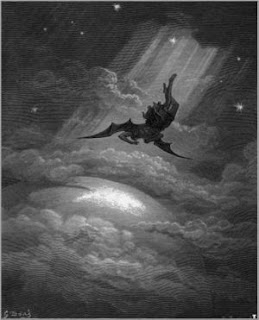
This week we are reading Milton's Paradise Lost, a book which is about as widely recognized as the Iliad or the Bible. We all know OF it, but few of us have actually taken the time to slow down and understand it. However, some of us (namely me) are currently getting the chance to do this under the guise of getting good grades. Tonight is Passover, but I have spent a good portion of it at home finishing homework. Not exactly the most spiritual idea ever, but God is good and he is faithful to meet us where we are. I opened up my homework assignment in Paradise Lost to Book III or the great consult of heaven. In this, Milton imagines that God, father and son, are sitting in heaven surveying for the first time the beauty of creation when they perceive that Satan is flying towards this glorious creation. Understanding immediately what is going to happen the Father speaks to the Son of the implications that Adam will most certainly fall and that there must be atonement for Adam's fall. He explains that because Adam will be deceived, he will receive grace, but that he [God] is fundamentally just and so there must also be the satisfaction of Adam's debt. All of these ideas are familiar to Christians as we have heard this since kindergarten Sunday school. What is not familiar is the idea that BEFORE Adam sinned, God knew. BEFORE Adam strayed, Christ had made a way for his redemption. The part of this narrative which leaves us, as readers, in awe is the descriptions which Milton provides of Jesus, son of God, and the dialogue which takes place to secure man's safety. Let me share just a few with you, I know they're long and in virtually a different language, but take a few moments over these next couple of days, not to read my words, but to imagine with me what has taken place in heaven and on earth to bring us to this day where we can stand redeemed and glorified:
Beyond compare the Son of God was seen
Most glorious. In Him all His Father shone
Substantially expressed and in His face
Divine compassion visibly appeared:
Love without end and without measure grace.
Man disobeying
Disloyal breaks his fealty and sins
Against the high supremacy of Heav'n,
Affecting godhead, and so, losing all,
To expiate his treason hath naught left
But to destruction sacred and devote
He with his whole posterity must die.
Die he or justice must, unless for him
Some other able and as willing pay
The rigid satisfaction, death for death.
Say, Heavn'ly Pow'rs, where shall we find such love?
Which of ye will be mortal to redeem
Man's mortal crime and, just, th' unjust to save?
Dwells in all Heaven charity so dear?
This desperate searching of heaven reveals absolute and utter silence. None are willing to subject themselves to the wrath and pain necessary to redeem creation's mistakes, your mistakes, my mistakes. But then a voice rises over the deafening silence:
Father, Thy word is past: MAN SHALL FIND GRACE!
... Behold Me then, Me for him, life for life,
I offer. On me let thine anger fall.
...I shall rise victorious and subdue
My vanquisher, spoiled of his vaunted spoil.
Death his death's wound shall then receive and stoop
Inglorious, of his mortal sting disarmed.
I through the ample air in triumph high
Shall lead Hell captive maugre Hell and show
The pow'rs of darkness bound. Thou at the sight
Pleased, out of Heaven shalt look down and smile
While by thee raised I ruin all my foes,
...then with the multitude of my redeemed
Shall enter Heav'n long absent and return,
Father, to see Thy face wherein no cloud
Of anger shall remain but peace assured
And reconcilement. Wrath shall be no more
Thenceforth but in Thy presence joy entire.
And so in a burst of immortal love so deep, so innate, that it is the very breath of who He is, our security is made sure before we have even erred. And all of heaven breathes a sigh of relief for:
Heav'nly love shall outdo hellish hate,
Giving to death and dying to redeem
(so dearly to redeem) what hellish hate
So easily destroyed and still destroys
In those who, when they may, accept not grace.
And for this act of selflessness, our humiliation is taken from us and we can stand, confident, bold, and joyful in the presence of the very one whose wrath would have assured our destruction, finding on his face no trace of the anger which was once directed toward us. And on the face of the one towards whom the anger actually was directed we find no trace of regret, rather pure, radiant joy that we would approach him and stand with him before the father in the victory of light over darkness.

No comments:
Post a Comment